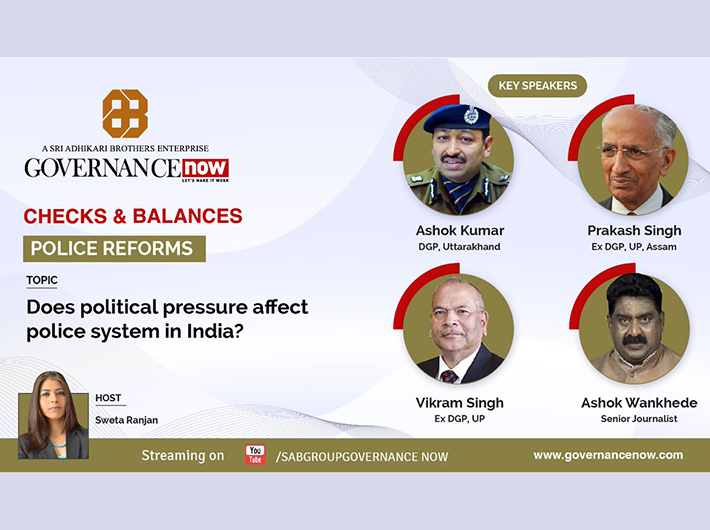Checks and Balances: Experts say Police Act needs amendments “not only to protect democracy but also to construct modern India”
Police reforms in our country are long overdue. Recently, Prime Minister Narendra Modi also stressed upon the need for police reforms. He called for radical changes in the police administration. He said that the policing system in the country had not changed in the 75 years after Independence and that the perception even now about the police is that “one should stay away from them”.
Chief Justice of India NV Ramana also recently said that the image of the police is tarnished. People hesitate to approach police in times of despair as their image is stained due to corruption, excesses, lack of impartiality and close nexus with the political class. He said, “People hesitate to approach the police in times of despair. The image of the institution of police is regrettably tarnished by allegations of corruption, police excesses, lack of impartiality and close nexus with the political class.”
But, then, why no reforms have taken place in 75 years? Why no measures were taken by the successive governments to introduce amendments in the Police Act of 1861 – if not its replacement?
Prakash Singh, former DGP of Uttar Pradesh who has always spoken in favour of police reforms, filed a PIL before the Supreme Court in 1996, which was expected to free the police from political control, mainly in relation to transfers and postings. On Singh’s appeal, the top court had issued directives to introduce police reforms but no party in power showed interest in making the police department more efficient and responsive to the needs of the people. Multiple commissions since 1971 have recommended a string of reforms but not much has been done in this direction.
The latest edition of ‘Checks and Balances’, an online discussion with experts on governance challenges hosted by Sweta Ranjan, focuses on the police reforms.
[You can watch this and previous episodes of Checks and Balances here: https://www.youtube.com/channel/UC-fTSP7yn4ZTD9EAHDCqq3Q]
Curiously, the need for police reforms has been highlighted for more than the last 120 years. First of all, the Police Commission constituted by Lord Curzon in 1902 had expressed concern in this direction. AHL Fraser, chairman of the Second Police Commission, had said that the police is seen as a corrupt and oppressive institution and its condition in the whole country is very unsatisfactory. The commission had expressed the need for immediate reforms in the police.
Even after more than a century, the situation remains the same. There does not appear to be any significant improvement or change in the police.
Taking cognizance of the misuse of the police force during the Emergency, when the Janata Party came to power, one of its first decisions was to constitute the National Police Commission under the chairmanship of former ICS Dharamveer for police reforms. Between 1977 and 1981, the commission submitted eight reports. It attached the draft of the Model Police Act in the last report of 1981, but this too could not be implemented. After which a public interest litigation was filed by Prakash Singh in the Supreme Court in 1996 for police reforms.
The contempt petition was filed in the court for non-compliance of the directions, since then the hearing is going on till now.
India’s politicians ignored the need for introducing the change in the police system and sat upon the legacy problem inherited from the colonial rulers. Experts say it suits them as they used policing as a tool to instill fear among people.
During the discussion, Prakash Singh said, “Police reforms are important not only to protect democracy but also to construct modern India. It’s important to understand that in 1861 the British government had introduced the Police Act after the rebellion of 1857. The British had understood that to rule over India successfully they needed a force that blindly follows their orders and is politically useful. After Independence in 1947, the government should have brought in changes with new goals and philosophy. With decline in the standards of politics there was a massive misuse of the police force. This was most prominent during the emergency period.”
Vikram Singh, a former top cop of Uttar Pradesh, said, “It is the frustration of the governments and their selfish approach that has obstructed the reforms in the police system. The governments have deliberately kept the police system handicapped for achieving their political goals. The comments made by the Frazer committee in 1902 are relevant even today. We are celebrating the 75th year of Independence, but no measure is taken towards police reforms. We have seen the example of Mumbai Police, it shows, if reforms are not introduced on time the result could be disastrous. It is the lack of willingness that is delaying this much needed reform.”
Ashok Wankhede, a senior journalist, said that the Supreme Court made a historic statement on September 22, 2006 by pointing out seven directives that should have been introduced immediately but nothing has been done till date. He said, “The cabinet includes 43 percent tainted ministers and 37 percent of them have cases of serious crimes like rape, murder and attempt to murder against them. How can you expect reforms to happen in the police system if such is the political set-up?”
Ashok Kumar, Director General of Police, Uttarakhand, said that his state has brought in reforms in the Police Act. He said, “Things have become better in the state but a lot needs to be done.”

